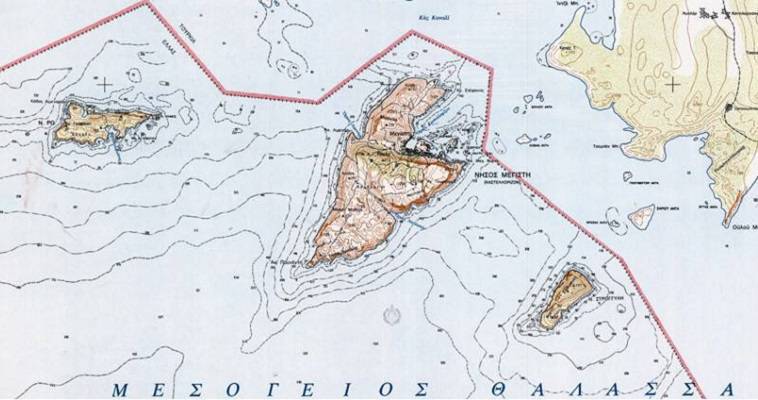Thodoros Kariotis: The crucial EEZ of forgotten Strongyli
04/07/2020
I still remember the trip back to Washington from New York by train when the UN Convention on the Law of the Sea ended in April 1982. My mind was on the Kastellorizo complex (Ro, Kastellorizo, Strongyli), because I had realized that the game with the Turks would be played at sea. I knew this was predicted to be savage, because the Turks left New York angry, knowing that Greece and Cyprus had won.
While Cyprus, 22 years later, managed to declare an EEZ, it seems that for Greece 38 years of waiting is not enough. So all of a sudden Greeks started a discussion about what kind of impact Kastellorizo has on the EEZ, without knowing exactly what that word means! Of course, the Greek delegation in 1982 knew that the key was Strongyli and not Kastellorizo. Greece has maritime borders with Cyprus, only if full influence is given to Strongyli. If Strongyli is not on the map and full influence is given to Kastellorizo, we simply have no contact with the EEZ of Cyprus.
I first wrote about the value of the Kastellorizo complex in 1985, but everyone had ignored me then. At that time, even the Greek maps did not reflect the complex of Kastellorizo. Now everyone is praising its value but many, even today, do not understand why it is so important for our national interests. The main reason is that the complex of these islands offers the possibility, based on the UNCLOS of 1982, for the EEZ of Greece to touch on the EEZ of Cyprus.
The discussion about the EEZ has been rekindled due to the statements of former minister Christos Rozakis on a radio show hosted by George Sahinis. If the excellent journalist had not asked penetrating questions, we would not have read so many articles on the concepts of influence, the 12 miles, the partial delimitation of the EEZ, the French islands off the coast of Canada and the British Isles near the coasts of France, and archipelagos. Let’s start from the Aegean as an Archipelago based on UNCLOS.
Aegean, the “Archipelago State”
I still remember our unique but significant defeat at the UN Conference on the Law of the Sea (1973-1982). At a meeting of the 2nd Committee, when the discussion concerned the concept of the “Archipelago State”, the head of the Greek delegation, the late Konstantinos Stavropoulos, took the floor to explain the word Archipelago. In complete silence, Stavropoulos explained that day that the word “Archipelago” is a Greek word and was first used in history to describe the Aegean!
He went on to say that Greece, based on this historic event, has the right to be referred to in the new Convention on the Law of the Sea as the “Archipelago State”. Unfortunately, the discussion that followed for several days did not adopt the Greek proposal. Thus UNCLOS recognizes as archipelago states only states that consist exclusively of islands. If our view had prevailed then, things would be very different in the Aegean today. Specifically, Article 47 of the UNCLOS defines the Archipelago States as follows:
For the purposes of this Convention:
(a) “archipelagic State” means a State constituted wholly by one or more archipelagos and may include other islands;
(b) “archipelago” means a group of islands, including parts of islands, interconnecting waters and other natural features which are so closely interrelated that such islands, waters and other natural features form an intrinsic geographical, economic and political entity, or which historically have been regarded as such.
Turkey’s nightmare
Article 121 of UNCLOS is always in my memory and I remember the struggles of the Greek and Cypriot delegations for its preservation and Turkey’s stubbornness for its annulment. Article 121 (2) leaves no room for doubt or misinterpretation, because it clearly states that:
2. Except as provided for in paragraph 3, the territorial sea, the contiguous zone, the exclusive economic zone and the continental shelf of an island are determined in accordance with the provisions of this Convention applicable to other land territory.
“With the exception of those provided for in paragraph 3, the coastal zone, the boundary zone, the exclusive economic zone and the continental shelf of an island shall be determined in accordance with the provisions of this Convention applicable to other terrestrial territory.” The exception to paragraph 3 states that: “Rocks which cannot sustain human habitation or economic life of their own shall have no exclusive economic zone or continental shelf.”
However, this exception does not affect the status of the Aegean, because, although there are such Greek rocks, they do not change the picture, as they are overlaid by the continental shelf, or the EEZ of the other inhabited islands of the Aegean. It was a great victory for the Greek islands and especially for the forgotten complex of Kastellorizo.
Kastellorizo lies 80 miles from Rhodes, 170 miles from Cyprus, but just one mile from Turkey, it is five square miles and is now inhabited by about 400 inhabitants, while at the end of the 19th century it had 10,000 inhabitants. Of course, this victory was not easy at all. It began in 1973 and ended in 1982. Delegations from Greece, Cyprus, Trinidad and Tobago and the United Kingdom, which participated in the 3rd UN Conference on the Law of the Sea, pioneered the adoption of the above Article.
The history of 12 nautical miles
In addition to disputes among experts over the continental shelf, the EEZ and The Hague, we are witnessing a controversy over the expansion of the Greek maritime zone, which was supposed to have taken place after the signing of the 1982 United Nations Convention on the Law of the Ocean and the Sea in Montego Bay, Jamaica.
It has been 38 years since then, but the phobic syndrome has not left us, as Greece is the only coastal state on the planet that does not have a 12-nautical-mile coastal zone and we are still fighting for what should be done. But we need to understand a few basic things:
We have to decide to expand the maritime zone (territorial waters) from six nautical miles to 12, throughout the territory. Partial expansion is a stupid trick and Greece will be ridiculed in the global community if we have six nautical miles in some areas, 8 for another, 10 for another 10 and for yet another 12. Unless we want to be written up in the Guinness Book of World Records to our detriment and to the mirth of Erdogan.
It will be just as tragic and perhaps even more ridiculous to undertake (because this was also heard) a partial declaration of the EEZ and, even more ridiculous, a partial delimitation of the EEZ!
To grasp the tragedy of Greece, we still do not know what UNCLOS provides for maritime zones. UNCLOS stipulates that if a state has an EEZ of 200 nautical miles and a maritime zone of 12 nautical miles, then the coastal state has a maritime zone of 12 nautical miles and an EEZ. That is why I was misunderstood when I argued that our sea area does not increase if we expand our territorial waters.
The size of our EEZ is the same either with territorial waters of six nautical miles, or of 12, as the increase in 12 nautical miles, as we saw above, does not affect the size of the EEZ. To be fair, it has been estimated that our EEZ, with a maritime zone of 6 nautical miles, encompasses 94.5% of the Aegean, while with 12 nautical miles it will own 95%!
The History of Influence and Justice
Suddenly many geopolitical analysts sprung up, dealing with the issue of influence and fairness, trying to explain that Kastellorizo has full influence. We need to take a historical look back at UNCLOS to finally understand what exactly these words mean.
The countries that took part in the Conference tried to fashion a formula for delimiting maritime zones of coastal states. Unfortunately, they did not succeed and the articles of the Convention simply avoided taking a clear position between the two conflicting tendencies, namely the “middle line” or equidistance and equity. Thus, we find that many differences have been resolved with the principle of equal distance, but also others with the principle of equity.
In many cases, some states accept both principles depending on their interests in different maritime zones. For example, the United States is adopting the principle of fairness in its dispute with Canada in the Gulf of Maine. On the contrary, they prefer equidistance in their agreement with Mexico, while in a future article we will refer to the example of France.






